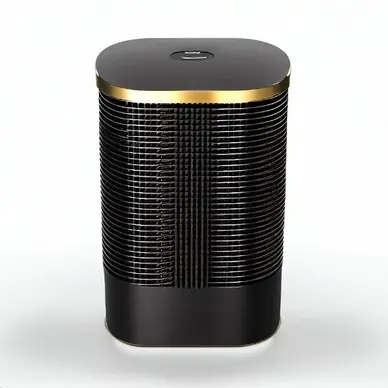
Key Takeaways: What are Air Purifiers and What Do They Do?
- Air purifiers are devices designed to filter the air in a single room or an entire home.
- They help rid the air inside your house from allergens, molds, and other toxins.
- Air purifiers consist of a filter, or multiple filters, and a fan that circulates air.
- They can remove over 99.97% of dangerous air particles, including allergens, dust, mold, viruses, and bacteria.
- There are different types of air purifiers, including filtered air purifiers, electrostatic air purifiers, and UV light air purifiers.
How Do Air Purifiers Work?
Air purifiers work by drawing in indoor air and passing it through an internal filter. The filter captures airborne contaminants like dust, smoke, pet dander, pollen, and other pollutants. Once the pollutants are trapped in the filter, clean air is pushed back into the room.
There are different types of filters used in air purifiers, such as HEPA filters, activated carbon filters, and UV filters. HEPA filters are considered the gold standard of filtration as they can capture particles as small as 0.3 microns with an efficiency of over 99.97%.
Activated carbon filters are effective at removing odors and gases, while UV filters use ultraviolet light to kill bacteria and viruses.
Types of Air Purifiers
1. Filtered Air Purifiers: These purifiers capture airborne pollutants and trap them in one or more filters. They are effective at removing particles like dust, pollen, pet dander, and mold spores.
2. Electrostatic Air Purifiers: These purifiers create charged particles to trap pollutants in a filter. They can be effective at removing particles, but may not be as efficient at removing gases.
3. UV Light Air Purifiers: These purifiers use UV light to kill bacteria and viruses. They can be effective at reducing the spread of airborne diseases, but may not be as effective at removing particles or gases.
Benefits of Air Purifiers
Air purifiers offer several benefits:
- Removing common airborne pollutants like dust, smoke, pet dander, and pollen.
- Creating a healthy atmosphere by eliminating odors and chemical agents.
- Improving the quality of life for individuals with allergies or asthma.
- Reducing respiratory symptoms caused by poor air quality.
While air purifiers may not be effective at removing all types of pollutants, they can still provide significant advantages for individuals with respiratory problems.
Scientific Evidence and Effectiveness
There is scientific evidence supporting the effectiveness of air purifiers in improving indoor air quality and reducing respiratory symptoms. While most filters on the market are effective at filtering particles like dust and pollen, they may not be as effective at removing gaseous pollutants like volatile organic compounds (VOCs) or radon.
Please note that air purifiers cannot remove all pollutants from the air, and regular ventilation with open windows is still the best way to remove airborne pollutants. However, air purifiers can complement ventilation efforts and provide additional benefits in reducing indoor air pollution.
Air purifiers are valuable devices that can help improve indoor air quality by removing pollutants and creating a healthier environment. They come in different types, each with its own advantages and limitations.
While they may not be able to remove all types of pollutants, they can still provide significant benefits, especially for individuals with respiratory problems.
Please choose the right type of air purifier based on specific needs and to understand their limitations.
Regular maintenance and filter replacement are also crucial to ensure optimal performance.
Links and references
- EPA Guide to Air Cleaners in the Home
- Air Purifiers Fact Sheet by UMass Amherst
- Guide to Air Cleaners by the University of Melbourne
- Consumer Reports Air Purifier Buying Guide
My article on the topic:
Frequently asked questions about air purifier
Related articles:
How do i clean the air filter in an air purifier?
What is the proper way to use an air purifier?
What are the functions of an air purifier?
What are the common uses of air purifiers?
How long can i expect an air purifier to last?
How long does it take for an air purifier to start working?
How many hours should i run an air purifier?
Did you find this article useful? I bet others will too.


